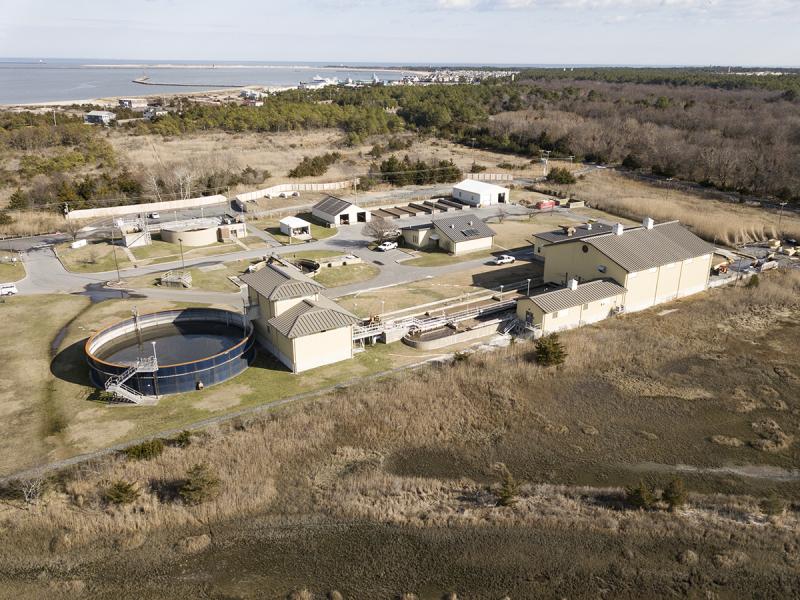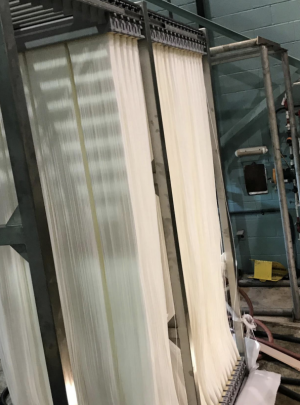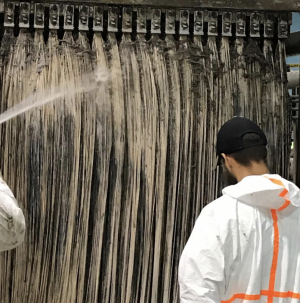The December failure at the Lewes wastewater treatment facility that sent nearly 4 million gallons of partially treated effluent into the marsh was avoidable. That’s the takeaway from the Board of Public Works’ 21-page root cause analysis report released Feb. 27.
BPW member Tom Panetta, charged with writing the report, determined the plant operator, White Marsh Environmental Systems Inc., a wholly owned subsidiary of Tidewater Utilities Inc., did not properly monitor the condition of the membrane filters or perform recommended cleaning and maintenance, resulting in a build-up of sludge on the membranes. The excessive sludge caused enough pressure to damage one of the filters, allowing dirty water through the filter and into a holding tank. Dirty water from the tank was then used to backwash all of the plant’s filters for at least 90 minutes, rendering all unusable and forcing the operator to bypass the filters and pump partially treated effluent into the marsh. The facility has meters in place to monitor water quality, but Panetta determined the plant operator changed the settings on the meters to reduce alarms. During a follow-up site visit, it was discovered the meters were returned to the correct settings.
“This indicates that White Marsh knew the correct set points,” the report reads.
Panetta, who spent 30 years writing root cause reports in the nuclear energy field, took the lead in the investigation, evaluating reports from the plant operator and manufacturer of the plant’s membrane filters, while also conducting interviews and analyzing data available from the plant’s computer systems.
A public meeting to discuss the root cause report is set for 6 p.m., Friday, March 13, in a location to be determined. It will be an opportunity for the public to comment and ask questions.
Avoidable incident
The report indicates that if either regular maintenance or proper setting of meters occurred, the situation likely could’ve been avoided. Data logs show there were numerous alarms in the days leading up to the failure, which should’ve been an indication that performance of the filters had degraded.
Panetta also identified other factors that led to the failure. He said White Marsh did not keep the BPW informed of the condition of the plant in monthly and annual reports, as required by its contract. He also determined there was insufficient trending of data. Had that occurred, he said, there could’ve been advanced notice that a failure was on the horizon.
Moving forward, Panetta said, the BPW must communicate more effectively with the plant operator. The BPW must be more proactive in ensuring the operator is performing its functions and obligations, and the BPW board needs to ensure controls are in place to monitor performance of operators, he said.
To do that, he said, BPW staff and its consulting engineers will have a quarterly walkthrough of the plant. They will also perform an engineering analysis of the plant to identify ways to improve redundancy and reliability.
In White Marsh’s report to the BPW, the operator says the membrane filters were nearing the end of their life and contributed to the failure. They also noted former operator Severn Trent recommended the filters be replaced in 2016. In addition, they said, the filter manufacturer, Suez, the number of chemical soaks and cleanings over the last decade adds wear and tear to the membranes and weakens their plastic hardware.
Through a report from filter manufacturer Suez, Panetta determined the plant’s filter membranes had not reached the end of their life when the incident occurred, and the failure had nothing to do with the age of the filters. He states that the useful life of filter hardware is 13 to 14 years, and the filters have been in service for 11 to 12 years.
In spite of that, BPW authorized the replacement of all four sets of filters at the plant, about $1 million in total. Two sets have already been installed, with the other two to be installed before May.
New revelations
The report revealed a similar incident occurred in April 2019. In that event, the plant operator received an alarm indicating contamination of the holding tank water. Unlike the December incident, the alarms were triggered early enough to alert plant staff, and the problem was isolated before harming other filters. White Marsh was able to identify the problem and repair it without bypassing the treatment process and discharging effluent. They stayed within the permit limits the entire incident.
“The seriousness of this earlier incident was not highlighted to the Lewes Board of Public Works nor did White Marsh take actions to determine the failure mode or corrective actions to prevent it from happening again,” the report reads.
Panetta also learned one set of the facility’s filters had been offline for eight months in 2019, from early January to late August.
Severn Trent operated the facility from 2007 until March 2017. During that time, the company routinely cleaned the filter membranes. The filter manufacturer visited the facility in March 2017 and recommended that the new operator manually clean the filters due to the significant amount of solids appearing on the filters.
White Marsh’s reports show limited cleaning was performed between March 2017 and December 2019, when the incident occurred.
Severn Trent comments
In a Jan. 27 email to the city provided to the Cape Gazette, an official at Inframark, formerly Severn Trent, said the December incident wasn’t a surprise.
“We had recommended replacing the membranes in our 2016 annual report and again in our proposal to renew the contract in 2017,” said Thomas Krall, business development manager. “The only reason the bypasses at the plant happened was because the membranes were ran to failure. Everything else is a distraction.”
Krall said BPW officials chose White Marsh in 2017 because they wanted a lower contract cost. The final year of Severn Trent’s contract exceeded $400,000, and BPW officials indicated the company’s bid was higher when seeking renewal. White Marsh’s initial contract was $252,000 and will be $284,000 when the contract ends in 2022. However, White Marsh’s contract includes unknown monthly costs for capital improvements based on time and materials. The contract also states the operator shall not be entitled to payments for 24-hour emergency response to problems arising out of negligence to provide proper operation and/or routine maintenance on the facility.
Krall said Severn Trent’s proposal included a robust maintenance program, which increased their bid price.
Panetta said Severn Trent had a different business outlook when it came up for renewal in 2017, and plans to expand into the Cape Region never happened.
“They made their bid higher to be able to operate a single plant,” he said.
White Marsh, on the other hand, operates several facilities in the area and can pool resources if a situation arises, as it did in December. In the report, Panetta praised Tidewater and White Marsh’s response during the bypass incident.
BPW General Manager Darrin Gordon said the BPW needs to have a good reason to not accept the lowest qualified bidder.
“At the time, we didn’t have any reason to believe White Marsh wasn’t the lowest qualified bidder,” Panetta said. “They had Level 4 state-certified operators. They were operating other plants. There was no history of them failing to perform, so it would’ve been somewhat irresponsible to continue with Severn Trent given that.”
The status of White Marsh’s contract has not changed, but Gordon said they will continue to monitor White Marsh to see how they operate the plant moving forward.
Fines possible
As spelled out in the contract, White Marsh is responsible for any fines that may result from the December incident. The Department of Natural Resources and Environmental Control’s notice of violation, issued Feb. 5, indicates penalties may be sought.
Gordon said he’s hopeful that if BPW meets all the requirements of the notice, fines will be avoided.
One of those requirements is to complete a wetlands assessment to determine how the discharged partially treated effluent affected the marsh adjacent to the wastewater treatment plant, for which the BPW has hired consultant Cardno.
“They’re going to go back and look at some GIS to see what it looked like prior, then take an assessment at the beginning of the growing season,” Gordon said. They will also look later in the season to determine any impacts.
If mitigation is necessary, Gordon said, the BPW will do whatever is needed.
The entire root cause report and other supporting documents can be found at www.lewesbpw.delaware.gov.
Nick Roth is the news editor. He has been with the Cape Gazette since 2012, previously covering town beats in Milton and Lewes. In addition to serving on the editorial board and handling page layout, Nick is responsible for the weekly Delaware History in Photographs feature and enjoys writing stories about the Cape Region’s history. Prior to the Cape Gazette, Nick worked for the Delmarva Media Group, including the Delaware Wave, Delaware Coast Press and Salisbury Daily Times. He also contributed to The News Journal. Originally from Boyertown, Pa., Nick attended Shippensburg University in central Pennsylvania, graduating in 2007 with a bachelor’s degree in journalism. He’s won several MDDC awards during his career for both writing and photography. In his free time, he enjoys golfing, going to the beach with his family and cheering for Philadelphia sports teams.























































